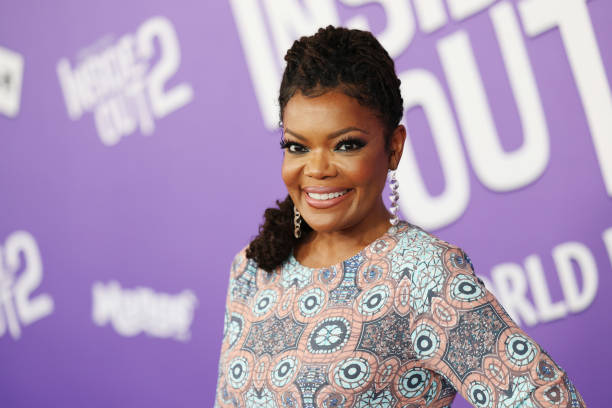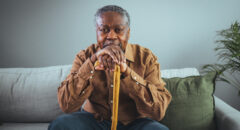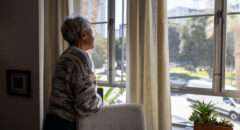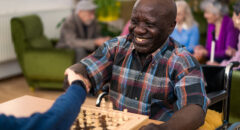
Yvette Nicole Brown, widely known for her roles in hit TV shows like “Community” and “The Odd Couple”, has taken on a role in her personal life that is more challenging and emotionally demanding than any character she has ever played. For over a decade, Brown has been the primary caregiver for her father, who was diagnosed with Alzheimer’s disease. Her journey, filled with love, sacrifice, and resilience, reflects the reality of millions of caregivers across the country, particularly within the Black community.
The Beginning of Brown’s Caregiving Journey
About 12 years ago, Brown noticed something unusual during her phone conversations with her father. He was “not quite there” anymore, and this alarming change prompted her to bring him from Ohio to California to live with her. Soon after, her father was diagnosed with Alzheimer’s disease, a progressive brain disorder that gradually impairs memory, thinking, and the ability to perform simple tasks.
Brown, now 53, didn’t hesitate to take on the responsibility of caring for her father. “It was the easiest decision I made because in my mind, he taught me so much. How can I not step up and be there for him in his moment of need? My dad comes first,” she told PEOPLE. This decision, however, meant significant sacrifices, including stepping away from her successful acting career to be fully present for her father.
The Challenges of Caregiving
As his primary caregiver, Brown describes herself as her father’s “cruise director,” ensuring that his days are as comfortable and enjoyable as possible. This role, while fulfilling, has been incredibly demanding. The emotional and physical toll of caregiving is something that Brown knows all too well. “I have always put his needs above my own, and I’m still putting his needs above my own because I want him with me. I need him with me,” she shared.
However, being a caregiver for someone with Alzheimer’s comes with a unique set of challenges. One of the most difficult aspects for Brown has been witnessing the gradual decline in her father’s cognitive abilities. “Dementia is weird in that at some point they sort of lose their sense of self and they no longer are the person that they used to be. So with my dad, there’s some days where he’s 100% there and there’s some days where he’s not,” Brown explained.
The physical demands of caregiving have also taken a toll. A few months ago, Brown’s father suffered a severe fall, breaking his hip. The injury required surgery and intense rehabilitation, which added a new layer of complexity to Brown’s caregiving responsibilities. After much deliberation, Brown made the heartbreaking decision to move her father into a board and care facility when it became clear that he could no longer be cared for at home.
“Releasing him to the care of other people was a very difficult thing to do and a very heartbreaking, guilt-ridden choice to make. But the goal was to get the best care for him, and that’s no longer me,” she admitted. The transition to a care facility marked a shift in Brown’s role from daily caregiver to primarily being her father’s daughter, a role she hadn’t been able to fully embrace for 11 years.
Navigating the Healthcare System
One of the most eye-opening and frustrating aspects of Brown’s caregiving journey has been navigating the healthcare system. Like many caregivers, she has faced numerous obstacles in trying to secure the best possible care for her father. “The red tape you have to jump through just to get basic care for your loved one is shocking,” Brown said.
From battling insurance companies to securing essential medical equipment, Brown found herself constantly advocating for her father’s needs. “I had to fight for his physical therapy. I had to fight for his wheelchair. I went through two or three appeals processes where he was going to be discharged from his nursing care facility before he was ready,” she recounted.
The bureaucratic hurdles and systemic inefficiencies left Brown feeling overwhelmed and frustrated. “I shouldn’t have to fight this hard,” she emphasized. “You can have the means to take care of them, but there are certain things they just still won’t give you. And I don’t understand why it’s this hard to make sure that people in need can have what they need and what they’ve been paying for.”
Despite these challenges, Brown’s determination never wavered. “If there’s any silver lining to everything I’ve been through with my dad, I am now equipped to fight for every other family caregiver in this country because I have walked the gauntlet, and I don’t want anyone to have to go through what I went through,” she said.
Launching the Squeezed Podcast
In an effort to support and advocate for other caregivers, Brown is launching a podcast called Squeezed on August 21, 2024. The show, produced by Lemonada Media, will feature healthcare providers, care workers, and caregivers from diverse backgrounds, discussing the challenges and joys of caregiving. Brown hopes that Squeezed will become a “safe space” for caregivers to share their experiences and learn from one another.
“Every important issue needs a voice, somebody to say, ‘This is happening to me. This may happen to you. This is how you navigate it,’” Brown emphasized. Through her podcast, she aims to create a platform where caregivers can find solace, understanding, and practical advice.
Alzheimer’s Impact on Black Americans
Alzheimer’s disease disproportionately affects Black Americans, who are twice as likely as white Americans to develop the condition. The reasons for this disparity are multifaceted, including higher rates of cardiovascular disease, diabetes, and other health conditions that increase the risk of Alzheimer’s. Additionally, systemic barriers to healthcare access and cultural stigmas surrounding mental health and aging further exacerbate the challenges faced by Black families.
Brown’s story is a poignant reminder of the unique struggles that Black caregivers often face. The emotional burden is compounded by navigating a healthcare system that can be difficult and unresponsive. The systemic inequalities and lack of adequate support services for Black families caring for loved ones with Alzheimer’s highlight the urgent need for reform and greater awareness.
Tips for Middle-Aged Adults Caring for Aging Parents
For those in the “sandwich generation”—middle-aged adults caring for both children and aging parents—here is some valuable advice:
- Prioritize Self-Care: While it’s natural to put your loved one’s needs first, it’s crucial to take care of yourself as well. Caregiving is a marathon, not a sprint, and maintaining your physical and mental health is essential for providing long-term care.
- Seek Support: Don’t be afraid to ask for help. Whether it’s from family, friends, or professional caregivers, having a support system can make a world of difference.
- Educate Yourself: Understanding Alzheimer’s and the progression of the disease can help you better anticipate and manage the challenges that come with caregiving.
- Navigate the Healthcare System: Be prepared to advocate fiercely for your loved one’s needs. This may involve understanding insurance policies, appealing decisions, and ensuring that your loved one receives the care they deserve.
- Find Community: Connecting with other caregivers, whether through support groups or online communities, can provide comfort and practical advice.






